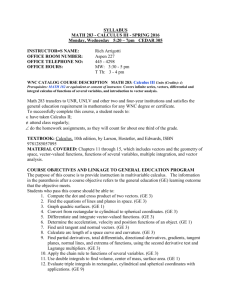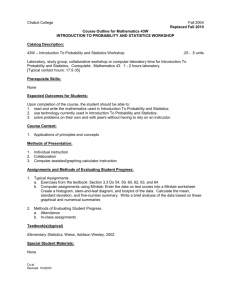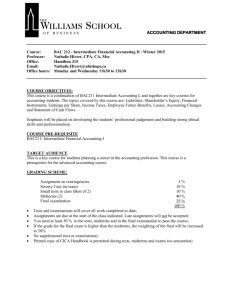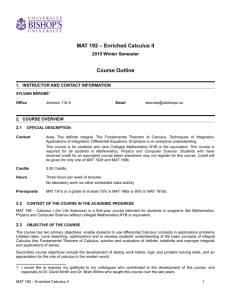MAT 192 Enriched Calculus II - Ubishops.ca
advertisement
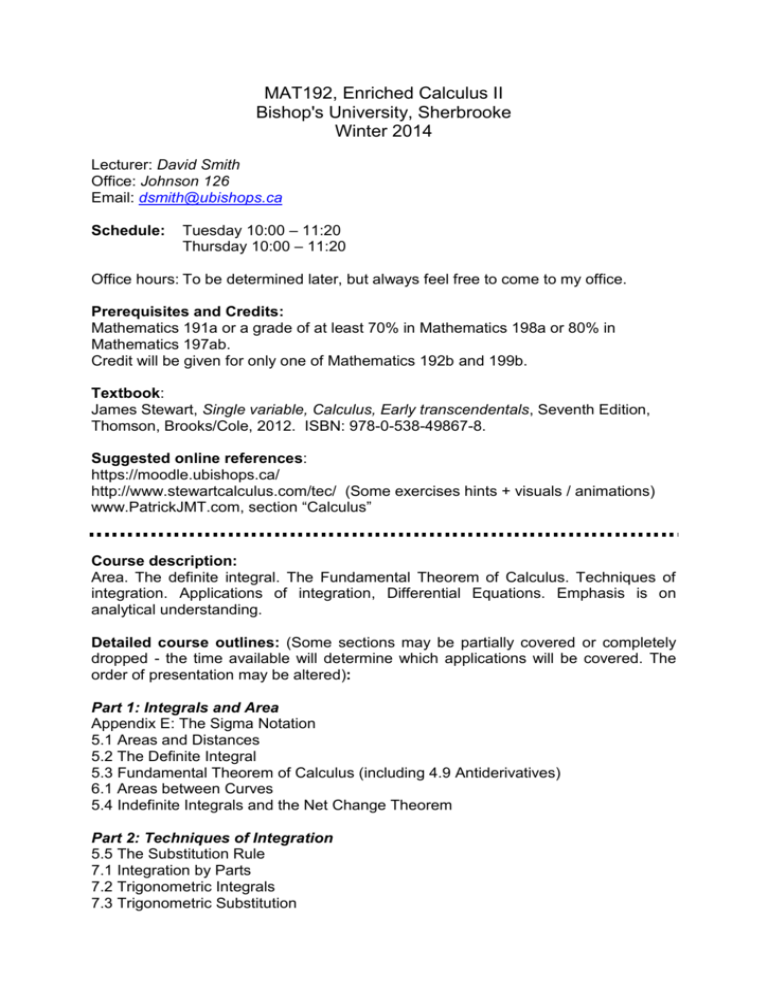
MAT192, Enriched Calculus II Bishop's University, Sherbrooke Winter 2014 Lecturer: David Smith Office: Johnson 126 Email: dsmith@ubishops.ca Schedule: Tuesday 10:00 – 11:20 Thursday 10:00 – 11:20 Office hours: To be determined later, but always feel free to come to my office. Prerequisites and Credits: Mathematics 191a or a grade of at least 70% in Mathematics 198a or 80% in Mathematics 197ab. Credit will be given for only one of Mathematics 192b and 199b. Textbook: James Stewart, Single variable, Calculus, Early transcendentals, Seventh Edition, Thomson, Brooks/Cole, 2012. ISBN: 978-0-538-49867-8. Suggested online references: https://moodle.ubishops.ca/ http://www.stewartcalculus.com/tec/ (Some exercises hints + visuals / animations) www.PatrickJMT.com, section “Calculus” Course description: Area. The definite integral. The Fundamental Theorem of Calculus. Techniques of integration. Applications of integration, Differential Equations. Emphasis is on analytical understanding. Detailed course outlines: (Some sections may be partially covered or completely dropped - the time available will determine which applications will be covered. The order of presentation may be altered): Part 1: Integrals and Area Appendix E: The Sigma Notation 5.1 Areas and Distances 5.2 The Definite Integral 5.3 Fundamental Theorem of Calculus (including 4.9 Antiderivatives) 6.1 Areas between Curves 5.4 Indefinite Integrals and the Net Change Theorem Part 2: Techniques of Integration 5.5 The Substitution Rule 7.1 Integration by Parts 7.2 Trigonometric Integrals 7.3 Trigonometric Substitution 7.4 Integration of Rational Functions by Partial Fractions 7.5 Strategy for Integration 7.8 Improper Integrals Part 3: Applications of Integration 6.2 and 6.3 Volumes 6.5 Average Value of a Function 8.1 Arc Length 9.1, 9.3 and 9.5 Differential Equations Evaluation: Assignments (20%): There will be periodic assignments worth a total of 20% of the final grade. Problems for the homework will be given in class and posted on Moodle. The best 7 assignments out of 8 will be considered in the calculation of the assignments average. Assignments have to be handed in at the beginning of the class. Late assignments will not be accepted. Complete solutions will be posted on Moodle after class. Students are encouraged to discuss problems with other students, and with the instructor. It is expected that final writing of homework solutions is done individually. It may happen that only selected problems, chosen at random, will be marked. The students have to see the assignments as a very important tool in preparation for the lectures, the midterms and the final exam. Tentative schedule for assignments (subject to change): Given January 16th January 28th February 4th February 18th Due January 23rd February 4th February 18th February 25th Given February 25th March 11th March 25th April 1st Due March 11th March 25th April 1st April 8th Midterms (35%): There will be two midterm exams of eighty (80) minutes duration. These exams should be held on February 13th and March 20th (subject to change). Their contents will be discussed in class. Final examination (45%): The final examination will be three hours in duration. This exam will cover the entire course outline, and will be worth 45% of the final grade. The date of the final examination will be determined by the Records Office. No supplemental examination will be allowed in this course. Notes: 1) The final grade will be calculated using the scheme below: Assignments: 20% Midterms: 35% Final Exam: 45% However, if at least seven assignments are completed and submitted on time, and you maintained an assignments average of at least 40%, then the following alternative to the grading scheme described above is allowed: A grade of at least 50% at the final exam will guarantee you to pass the course. When this applies, your final grade will be the maximum between 50% and the mark obtained using the marking scheme described above. 2) The use of aiding devices such as programmable calculators and translators are not permitted during the writing of exams. Basic calculators will be allowed, if judged necessary. No computer, cellphone, music player, etc. will not be tolerated in class.


